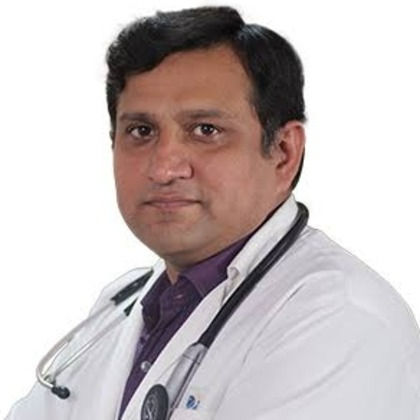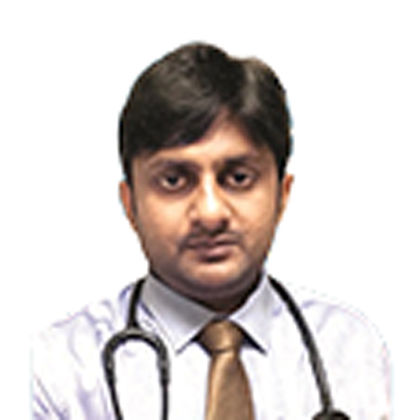Shortness of Breath: Causes, Symptoms & Treatment
Struggling to breathe? Learn the causes, symptoms, and treatments for shortness of breath. Find out when to seek medical help and how to manage it effectively.

Written by
Last updated on 3rd Jul, 2025
Introduction
Do you struggle to breathe after climbing stairs? This is normal for many of us. But when struggling to breathe without a clear reason can be unsettling. Shortness of breath, also called dyspnea, is a common yet serious symptom that you shouldn’t ignore. It can occur gradually or strike suddenly and make even simple activities exhausting for you.
Your lungs, heart, and muscles all work together to ensure your body gets enough oxygen. When any part of this system is disrupted, your breathing can become heavy. Sometimes, shortness of breath is harmless such as during exercise or when at high altitudes. But in other cases, it can signal your risk of conditions like asthma, heart disease, or lung infections. You can take the first step to address this problem by knowing about it.
Causes of Shortness of Breath
Persistent or sudden difficulty in breathing can be your body’s response to a health problem. The causes fall into three main categories such as respiratory conditions, heart-related issues, and other medical disorders.
Some conditions directly affect your lungs and others disrupt oxygen flow to your heart and other major organs. You must identify the root cause as ignoring breathlessness can worsen your problem over time. The major causes are:
1. Respiratory Causes
Your lungs play a central role in breathing, so when they’re affected, shortness of breath is inevitable. Common respiratory causes include:
Asthma – Your airways become inflamed and narrow and make it hard for you to breathe.
Chronic obstructive pulmonary disease (COPD) – A progressive lung disease that restricts airflow in your body.
Pneumonia – A lung infection fills your air sacs with fluid and reduces oxygen exchange.
Pulmonary embolism – A blood clot blocks your lung arteries and cuts off oxygen supply.
Lung fibrosis – Your lung tissues get scarred and make it difficult for you to take deep breaths.
2. Cardiovascular Causes
Your heart and lungs work closely together, so heart-related issues can also cause breathlessness. Key culprits include:
Heart failure – Your heart struggles to pump blood and this causes a buildup of fluid in your lungs.
Coronary artery disease (CAD) – Your arteries become narrowed arteries and limit oxygen supply
Arrhythmia – Your heartbeats become irregular and reduce the circulation of oxygen-rich blood.
Heart attack – Your arteries get blocked and cause sudden shortness of breath and chest pain.
3. Other Medical Conditions
Sometimes, breathlessness isn’t directly linked to your lung or heart disease. There are some other conditions that can make you short of breath:
Anaemia – Low red blood cell count means less oxygen is carried to tissues.
Anxiety and panic attacks – Stress can trigger hyperventilation and breathlessness.
Obesity – Excess weight puts pressure on the lungs, making breathing harder.
Kidney disease – Fluid retention can lead to lung congestion, causing shortness of breath.
No matter the cause, persistent difficulty in breathing should never be ignored. If breathlessness is sudden or severe, seeking medical attention is crucial.
Symptoms Accompanying Shortness of Breath
If you have an underlying disease, then you may not experience shortness of breath only. You may also experience other symptoms as well. Some signs will appear suddenly and others will develop gradually. Knowing these symptoms will help you determine whether the condition is temporary or something more serious.
1. Acute Symptoms
These symptoms will affect you suddenly and may be a sign of a medical emergency:
Chest pain or tightness – This could indicate a heart attack or pulmonary embolism.
Bluish lips or fingers – This may suggest that you have low oxygen levels due to some serious condition.
Severe dizziness or fainting – This may be a sign that your blood pressure is low or indicate a heart condition.
Wheezing or gasping - A common symptom in patients with asthma attacks and allergic reactions.
Confusion or disorientation – This happens when your brain isn’t getting enough oxygen.
2. Chronic Symptoms
If your breathlessness persists over time, it may be due to a health condition such as
Fatigue – If you feel exhausted despite getting rest, it could be a sign of anaemia or heart failure.
Swelling in your legs or abdomen – Often associated with heart or kidney disease.
Persistent cough – COPD, lung infections, or chronic bronchitis may be a cause if you cough persistently.
Gradual exercise intolerance – Lung or heart disease may be a cause if you struggle with routine activities.
If you notice acute symptoms, seek immediate medical help. While chronic symptoms don’t usually require urgent care, you should still consult your doctor to rule out your risk of a serious health condition.
Diagnostic Evaluations
You should consult a doctor to find the root cause when your shortness of breath becomes frequent or unexplained. Doctors will use physical assessments and advanced tests to pinpoint the reason behind your condition.
1. Physical Examination
Your doctor will conduct a thorough check-up and observe your breathing pattern, heart rate, and oxygen levels. They will listen to your lungs for abnormal sounds like wheezing or crackles. He or she may also question you about your history of medical conditions and your lifestyle to single out possible causes.
2. Pulmonary Function Tests
These tests will assess your lung capacity and efficiency. Spirometry will measure how much air you can inhale and exhale. A peak flow test will check your airway restriction. The test is useful to detect your risk of asthma and COPD.
3. Imaging Studies
X-rays and CT scans can give a clearer picture of your lungs and heart. A chest X-ray will be useful to identify your risk of infections, buildup of fluid, or lung collapse. A CT scan will provide a view of abnormalities like blood clots and tumours in your body. You may also have to undergo an echocardiogram if your doctor suspects you have a condition affecting your heart function.
Treatment Options
The treatment you receive for shortness of breath will depend on your underlying condition. For some conditions, you may require immediate medical attention. In other cases, you may be recommended lifestyle changes and medications to manage your condition
1. Medications
Your doctors will give different medications based on the cause of your breathlessness:
Bronchodilators – These will help relax your airways if you have asthma or COPD.
Steroids – These medicines will help reduce inflammation if you have a lung disease.
Diuretics – These will help remove excess fluid if you have heart failure to ease your breathing.
Anticoagulants – These medicines will prevent blood clots if you have pulmonary embolism.
2. Lifestyle Adjustments
Simple changes may significantly improve your breathing:
Quitting smoking – Reduces your lung damage.
Maintaining a healthy weight – Eases pressure on your lungs.
Breathing exercises – Techniques like pursed-lip breathing will improve oxygen circulation in your body.
Avoiding triggers – You can prevent flare-ups by managing your exposure to allergies and air pollution.
3. Surgical Interventions
You may need surgery if you have a severe or life-threatening condition. Some of the surgery options are:
Lung transplants – if you have end-stage lung disease.
Bypass surgery or stents – To improve your blood flow if you have a heart-related condition.
Thoracic surgery – This will remove tumours and repair damage to your lungs.
Preventative Measures
You can manage and, in some cases, even prevent shortness of breath by making smart lifestyle choices. While you may not be able to avoid it in some cases, you can still reduce your risk by maintaining your lung and heart health.
1. Healthy Lifestyle Habits
A strong body supports better breathing. Key habits include:
Regular exercise – Strengthens the lungs and improves oxygen efficiency.
Balanced diet – Supports heart and lung function with essential nutrients.
Weight management – Reduces strain on the respiratory system.
Good posture – Helps lungs expand fully for better airflow.
2. Avoiding Triggers
Certain environments and habits can worsen breathlessness. Preventative steps include:
Quitting smoking – Protects lung function.
Reducing pollution exposure – Using air purifiers and avoiding smoky areas.
Managing allergies and asthma – Identifying triggers and taking preventive medications.
By adopting these measures, you can breathe easier and lower the risk of long-term complications.
When to Seek Medical Attention?
Not all breathlessness is cause for concern, but when it becomes severe or persistent, medical help is essential. Ignoring symptoms can lead to serious complications. Here’s when to seek professional care:
1. Emergency Symptoms
Call for immediate medical help if you experience:
Sudden, severe shortness of breath – Especially if it occurs at rest.
Chest pain or pressure – May indicate a heart attack.
Bluish lips or fingers – A sign of dangerously low oxygen levels.
Confusion or dizziness – Suggests oxygen deprivation to the brain.
Wheezing, choking, or gasping – Can indicate airway blockage or an asthma attack.
2. Persistent or Worsening Symptoms
Even if symptoms aren’t severe, medical attention is needed if:
Breathlessness worsens over time – Could indicate chronic lung or heart disease.
Breathing difficulties disrupt daily life – Struggling with routine activities isn’t normal.
A chronic cough or swelling accompanies breathlessness – Signals an underlying health condition.
Timely medical care can prevent complications and improve quality of life. Don’t ignore warning signs—your health depends on it.
Prognosis and Complications
You might wonder—how does shortness of breath affect your long-term health? Well, that depends on the cause. Some cases resolve on their own, while others need ongoing management. The key is to act early and take control of your health.
1. Long-term Outlook
If your breathlessness comes from anxiety, infections, or mild conditions, treatment can get you back to normal. But if it’s linked to something serious, like COPD or heart disease, you’ll need long-term care. The good news? With the right treatment and lifestyle changes, you can still live a fulfilling life.
2. Potential Complications
Ignoring your symptoms can lead to bigger problems. Here’s what might happen if you don’t take action:
Respiratory failure – When your lungs can’t supply enough oxygen.
Heart strain – If your heart works too hard, it can weaken over time.
Limited mobility – Struggling to breathe can make even simple tasks feel exhausting.
Living with Shortness of Breath
Living with breathlessness can feel frustrating, but you’re not powerless. The right habits can help you breathe easier and stay in control.
1. Coping Strategies
You don’t have to let shortness of breath slow you down. Here’s what can help:
Pursed-lip breathing – Slows down your breathing and helps you get more oxygen.
Using oxygen therapy – If your doctor recommends it, this can make a big difference.
Keeping active – Light exercises, like walking or yoga, keep your lungs strong.
Avoiding smoke and dust – Clean air makes breathing easier, so control your surroundings.
2. Support Systems
You don’t have to handle this alone. Having the right support can make things easier:
Regular check-ups – Your doctor can track progress and adjust your treatment.
Talking to others – Support groups help you connect with people who understand.
Managing stress – Anxiety makes breathing harder, so relaxation techniques help.
Conclusion
Shortness of breath isn’t something to ignore. Whether it’s a minor issue or a sign of something serious, knowing the cause is important. The sooner you take action, the better your chances of managing it.
If you ever feel breathless without a clear reason, don’t brush it off. And if your symptoms get worse, it’s time to see a doctor. Your health is in your hands, and taking that first step toward medical care can make all the difference.
Consult Top Pulmonologist
Consult Top Pulmonologist

Dr Rikin Hasnani
Pulmonology Respiratory Medicine Specialist
14 Years • MBBS NTR University of Health Sciences MD NTR University of Health Sciences
Hyderguda
Apollo Hospitals Hyderguda, Hyderguda

Dr. Keshavan. V.
Pulmonology Respiratory Medicine Specialist
10 Years • "MBBS (CMC, Vellore) MD (CMC, Vellore) DNB EDARM (France) SCE(UK) ATSF (USA) MRCPS (Glasgow) FCCP (USA) FAPSR (Japan) MNAMS"
Hyderguda
Apollo Hospitals Hyderguda, Hyderguda

Dr Harshitha Degapoodi
Pulmonology Respiratory Medicine Specialist
1 Years • MBBS , MD Pulmonary Medicine .
Hyderabad
Apollo Hospitals D R D O kanchanbagh, Hyderabad

Dr. Nikhil Modi
Pulmonology Respiratory Medicine Specialist
15 Years • MBBS, MD, FCCP, EDARM, IDCCM
Delhi
Apollo Hospitals Indraprastha, Delhi
(225+ Patients)

Dr. K R R Umamahesh Reddy
Pulmonology Respiratory Medicine Specialist
9 Years • MBBS, MD Pul Med.
Nellore
Apollo Speciality Hospitals, Nellore
(25+ Patients)
